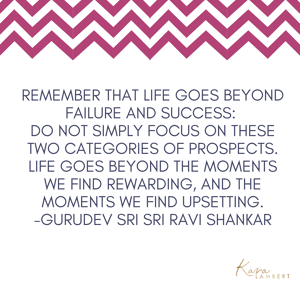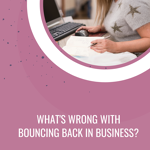While I do plan my blogs, there are others that just scream at me as themes I see in my conversations, ‘bouncing back in business’ is one of them. What has finally prompted this blog was listening to this podcast between Adam Grant and Alyson Felix. I was actually disappointed by what was said. Then I thought about another blog I had planned based on a discussion with a client, seems I needed to wait to gather more of my thoughts together before I wrote about bouncing back in business.
What do we mean by bouncing back in business?
Bouncing back generally means coming back from some adverse event.
If I think about it literally, I think of a ball being dropped, hitting the bottom, and coming back up. If I take that one step further, it’s straight down and straight back up. If you think about this action in real life, a ball never returns to the height it was dropped from, it loses energy in the bounce and we need to move a little lower to catch it.
That stings a little when you think about business. I don’t know about you but I lose energy in the bounce back too.
When I think about my recovery from burnout and bouncing back from there, I had to reach deep to catch my ball. It also took a long time for me to straighten up and keep going.
What is wrong with the bouncing back analogy when it comes to business?
I’m not sure I know of any business owners who want to bounce back to where they were, or worse a little lower than they started when the adverse event happened. Most understand that there is a recovery period, a time to regroup and recoup. Some might even take the time to reassess and redefine, I know I have done this a couple of times.
What I do know is that the smart business owners will learn and grow when they bounce back. And this is where I have an issue with the term.
Let’s look at the term itself ‘bounce back’. Firstly, there’s the word ‘bounce’:
to spring back from a surface in a lively manner
Sure, sometimes we can spring back in a lively manner, other times, it’s slow or even laboured.
And now the word ‘back’:
in, into, or towards a previous place or condition
This is actually difficult to achieve after an event in business and I want to explain why.
Firstly, there is the idea that it should/needs to happen in a “lively manner”. Um, no. Surely by now we can honour ourselves to have a little wallow in our misfortune, to wobble around and try the new situation on for size for a while, and to work out not only how we are moving on from here but what “here” looks like, the path we’d like to take, and the destination we foresee at the end. I’m not keen on some knee-jerk reactive rebound. (Growing up rebounds were generally regretted)
We often cannot return to our previous place or condition in business as we now have knowledge of what got us there, caused the event, and how we got out of there. Not to mention that some of us don’t want to return to their “previous place or condition” or have decided to take the opportunity to redefine and move towards a new place or condition in their business.
Following on from this is one of the issues I have with the Adam Grant interview, coming back from a break to become a parent is not ‘bouncing back’. I know he was probably talking about Alyson’s athletic abilities but that is her craft and the core of her business. (well, it was back then) Becoming a parent taught me so many new skills:
- Patience at a whole other level
- Re-evaluated ideals and expectations
- Different priorities
- Ability to juggle more priorities
- Increased capacity
- Increased mental load (not always good but a skill to cope with it all none the less)
- Being ok with being late (that was hard)
- Different negotiation and management skills (especially when I had two under two)
Returning to work as a parent increased my skills, I did not bounce back. I was different. A point that Alyson alludes to in the podcast.
The other issue I have with ‘bouncing back’ is that we seem to be a passive participant in it all. This was the point I made to a client the other week when they realised that they had “dropped the ball” in their business. I said to them, “so long as you catch it on the bounce and keep going”. We have the ability to catch ourselves anywhere after an adverse event, we also have the ability to move forward as the even unfolds and as we recover. We do not have to stay still and wait for what comes.
What can we do about bouncing back as business owners?
Think about the opportunities we’re afforded when we drop the ball or things go wrong.
Realise that you often come out the other side with new skills and knowledge.
Know that you can pick up and keep going at any time, you don’t have to wait for the bounce.
It’s your business, you get to do things in your timeframe, it doesn’t have to be in a lively manner.
In this blog post, I’ve discussed what’s wrong with bouncing back in business. I hope you found it to be a helpful and informative read. If you have any questions about bouncing back in business and how to navigate it, please contact me anytime or book a free chat. Thank you for reading, I’m always excited when one of my posts is able to provide useful information on a topic like this!


